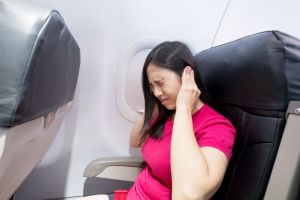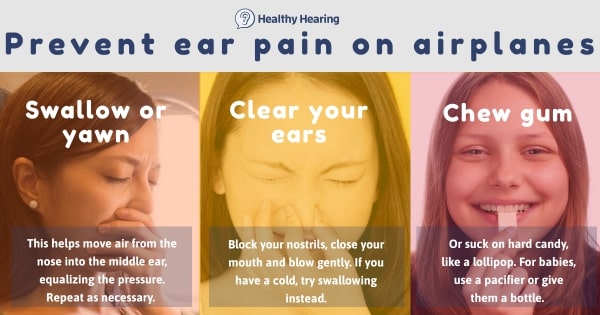|
www.HealthyHearing.com |
Airplanes and ear painHow to prevent ear popping and pressure when you travel on planes
Contributed by Joy Victory, managing editor, Healthy Hearing Key points:
Most of us have experienced clogged ears or ear pain at some point during a flight. This condition is often referred to as "airplane ear." More often than not, it occurs during takeoff or landing. For some people, it may just be a minor annoyance, but for others it can cause symptoms like severe pain and temporary hearing loss. How to prevent ear pain when flying
Equalize ear pressureEar pain from flying happens when there is a change in altitude and your ears have trouble equalizing. Thankfully, there are several steps you can take to introduce as much air as possible via the Eustachian tube to help equalize the pressure.
Stay hydrated and awakeDrink lots of fluid on both before and during the flight. Not only does this keep you hydrated, which reduces your risk of congestion, but it also means you'll be swallowing and equalizing your ears regularly. It's also important to stay awake during ascent and descent, if possible, to do things like yawn, chew or swallow to prevent pressure buildup. Try filtered earplugs (EarPlanes)Products like EarPlanes are specially designed ear plugs that have a filter that help slow down the air pressure changes on the flight, which can put less stress on the eardrum, reducing feelings of pain and fullness. Use decongestantsOver-the-counter nasal and oral decongestants narrow the blood vessels in the nasal passages and reduce or thin mucus, making it easier for air to flow through the Eustachian tubes. Before taking any decongestants, it is important to speak with your doctor, as people with certain heart conditions may want to avoid taking them. To use:
Tips for relieving airplane ear pain in babies, toddlers and kidsKids have more airplane-related ear pain due to having narrower Eustachian tubes than adults. For babies and younger kids, use a bottle or pacifier during takeoff and landings. This helps increase swallowing, which equalizes the pressure in their ears. Older children can suck on a lollipop, drink through a straw or blow bubbles through a straw to relieve ear pain. Before the flight, you can also talk to a pediatrician about the possibility of pain relieving eardrops for use while in the air. Why does airplane ear happen?
travel can lead to ear pain and pressure. It all comes down to rapid fluctuations in air pressure. Normally the air pressure inside the inner ear and the air pressure outside are essentially the same, or at least not different enough to cause any trouble. Even if you were to hike to the top of a tall mountain, the slow speed of your ascent would allow time for the pressure to equalize along the way. A problem only occurs when the change in altitude is so rapid, like it is in air travel. The pressure inside the inner ear and the air pressure outside don’t have time to equalize. This is known medically as ear barotrauma. When your flight takes off and the plane begins its ascent, the air pressure inside the inner ear quickly surpasses that of the pressure outside. The tympanic membrane or eardrum swells outward. Picture a loaf of bread rising while baking, and you get the idea. Conversely, if air pressure inside the inner ear rapidly becomes less than the air pressure outside, the tympanic membrane will be sucked inward, almost like a vacuum effect. What has happened is that the Eustachian tube has flattened and needs a bit of help from you to continue to do its job of bringing air into the inner ear. Whether ascending or descending, the stretching of the eardrum can cause pain.
During this time, the eardrum is not able to vibrate, so you also experience decreased hearing and muffled sounds. Can flying worsen tinnitus?Air travel—or any abrupt change in elevation or air pressure—can trigger ringing in the ears, notes Tackling Tinnitus columnist Glenn Schweitzer, who addresses this and other common problems in 10 tips for people traveling with tinnitus. Don't risk a ruptured eardrum when sickIf you are very sick with a cold, the flu, allergies or experiencing any congestion, you should consider changing your travel plans if possible. Your fellow travelers will appreciate one less sick person spreading germs around the plane’s cabin, and your illness can cause a blockage in the Eustachian tube. In severe cases of airplane ear, your eardrum can rupture or you may develop a severe ear infection which may lead to permanent ear damage. When to see a specialistMost times, ear pain or fullness resolve on their own shortly after landing. If you're still noticing symptoms several hours later, you can try taking a hot shower, using a warm compress, or using the equalizing maneuvers discussed above. If the pain persists or your hearing doesn’t return to normal within a few days post-flight, it’s important to schedule an appointment with a doctor. They may refer you to an ENT (ear, nose, and throat) specialist or a hearing professional to assess your symptoms and determine if there’s an underlying infection, blockage, or other issue. Visit our directory to find a hearing specialist near you and ensure your ears stay healthy and safe, both during travel and in everyday life. More: Wear hearing aids? Check out our air travel tips for people who wear hearing aids. Joy Victory, managing editor, Healthy Hearing
Related Help Pages:
Hearing loss Children's hearing loss Middle ear infections Tinnitus (ringing in the ears)
|
Featured clinics near me
Hearing Health Solutions from Ohio ENT - Columbus
974 Bethel Rd Ste B
Columbus, OH 43214
Earzlink Hearing Care - Reynoldsburg
7668 Slate Ridge Blvd
Reynoldsburg, OH 43068

Find a clinic
Need a hearing test but not sure which clinic to choose?
Call 1-877-872-7165 for help setting up a hearing test appointment.



 Joy Victory has extensive experience editing consumer health information. Her training in particular has focused on how to best communicate evidence-based medical guidelines and clinical trial results to the public. She strives to make health content accurate, accessible and engaging to the public.
Joy Victory has extensive experience editing consumer health information. Her training in particular has focused on how to best communicate evidence-based medical guidelines and clinical trial results to the public. She strives to make health content accurate, accessible and engaging to the public.